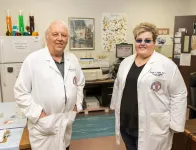(Press-News.org) Advances in lung cancer treatment highlight importance of tumour testing at diagnosis
Research presented at the ESMO Congress 2023 sets potential major changes in first-line treatment for patients with NSCLC with targetable tumour cell mutations
Lugano, Switzerland, 17 October 2023 – More people with non-small cell lung cancer (NSCLC) are likely to benefit from new drugs that target molecular alterations in tumour cells, with less need for chemotherapy, following results of multiple landmark clinical trials reported for the first time in late-breaking presentations at the ESMO Congress 2023 (1-7). Better outcomes were achieved with combinations of experimental new drugs targeting common and rare tumour mutations than with standard treatments, with improvements seen in both early and late-stage NSCLC – the type of lung cancer responsible for approximately eight out of 10 cases of the disease (8).
“The results are very impressive and mean that we can expect major changes in first-line treatment for patients with NSCLC with these targetable tumour cell alterations, and in the way we care for patients whose previous treatment has stopped working,” said Professor Alessandra Curioni-Fontecedro, University of Fribourg, Switzerland. “As a result, it will be more important than ever that lung cancer is diagnosed and treated by lung cancer specialists with access and understanding of molecular testing and findings,” she added.
Dr Elene Mariamidze, Todua Clinic, Tbilisi, Georgia, agreed: “We are entering an era of personalised medicine in NSCLC where we are using combinations of novel, targeted agents, and it will be essential to know the whole mutational burden of each patient at diagnosis so we can properly plan the most effective and least toxic approach. The future of lung cancer care lies in finding the right combination of targeted treatment, or chemotherapy with immunotherapy for each patient.”
Both Curioni-Fontecedro and Mariamidze highlighted data from studies using a new combination of targeted drugs in patients with advanced or metastatic NSCLC who had an EGFR mutation – one of the most common tumour mutations (1,2). When people were given the combination as first-line treatment, progression-free survival (PFS) was significantly better than with the current most effective treatment for the mutation (1). In people who had already progressed on this current standard of care, the new targeted drugs, combined with chemotherapy, significantly improved PFS compared with chemotherapy alone (2).
“We still need to see that the new combination leads to improved overall survival compared with current treatment. We also need to understand more about the effects in patients with brain metastases as it appears that one of the newer EGFR-targeting agents used in these studies has good penetration of brain tissue,” commented Curioni-Fontecedro.
“These studies show that patients now have a potentially new drug combination for their treatment that works partly by targeting EGFR mutations, and partly by directing immune cells to destroy cancer cells. The fact that the combination worked better than the current standard of care, not just better than placebo, shows tangible benefits for this new approach,” added Mariamidze.
Results of NSCLC studies presented at the ESMO Congress 2023 also suggest that using mutation-targeted treatment can reduce the need for chemotherapy in some patients, including those with some rarer tumour alterations for which targeted treatment options have previously been limited. These include patients with operable, early stage ALK-positive NSCLC (3), those with RET-mutated advanced NSCLC (4), and those with the less common, more difficult to treat EGFR mutation, Exon 20 insertion, advanced NSCLC (5).
In addition, study data reinforce the value of adding immunotherapy to chemotherapy in some types of NSCLC, including the use of this treatment before surgery for patients with operable cancers to shrink tumours and indicate likely response to further treatment after surgery (so called, neoadjuvant treatment) (6).
“We know that patients have a better prognosis if pre-surgical treatment of lung cancer leads to tumour disappearance on pathology reports after surgery (pCR-pathologic complete response) than if there are still obvious cancer cells present in post-surgical material. The new results show that adding immunotherapy to chemotherapy before surgery, and then continuing with maintenance immunotherapy for a year after surgery, is more effective than just giving chemotherapy before surgery,” Mariamidze pointed out.
Even for patients with advanced or metastatic NSCLC who have relapsed following previous treatments and can only be given chemotherapy, there is good news. Directing chemotherapy more precisely at tumours using antibody drug conjugates, namely antibodies that recognise specific proteins commonly found in lung cancers significantly improved PFS compared to currently used chemotherapy (7).
“The approach using these antibody drug conjugates will make a big difference for the majority of patients with advanced or metastatic NSCLC who have stopped responding to first and second-line treatments, irrespective of whether they have targetable mutations. We need to know more about the side-effects of this approach but these findings are likely to change the standard of care for these patients,” predicted Curioni-Fontecedro.
Following such promising NSCLC data presented at ESMO 2023, the next step for both Curioni-Fontecedro and Mariamidze is to better understand the sequence of treatments that will give the best outcomes for patients.
“We still face the dilemma of what we do after patients have had these promising new drugs and need further treatment. It will be very important to understand the sequencing of treatment now that we have so many more options for treating NSCLC so that we can achieve the best possible results for each patient,” said Curioni-Fontecedro.
“Very few patients benefit from one therapy alone, and most will need combinations of treatments at different times in their lung cancer care. We need further research to show when and how to target different mutations, possibly including new targets, and to help establish the ideal treatment plan for patients with lung cancer who develop extensive disease,” concluded Mariamidze.
-END-
Notes to Editors
Please make sure to use the official name of the meeting in your reports: ESMO Congress 2023.
Official Congress Hashtag: #ESMO23. Follow it to stay up to date and use it to take part in the conversation on X (Twitter), LinkedIn, Instagram, Facebook
Disclaimer
This press release contains information provided by the author of the highlighted abstract and reflects the content of this abstract. It does not necessarily reflect the views or opinions of ESMO who cannot be held responsible for the accuracy of the data. Commentators quoted in the press release are required to comply with the ESMO Declaration of Interests policy and the ESMO Code of Conduct.
References
1 Abstract – LBA14. Cho BC et al. Amivantamab plus lazertinib vs osimertinib as first-line treatment in patients with EGFR-mutated, advanced non-small cell lung cancer (NSCLC): primary results from mariposa, a Phase 3, global, randomized, controlled trial will be presented by Byoung Chul Cho during Presidential 3 Session on Monday, 23 October, 16:30 to 18:15 (CEST) in Madrid Auditorium – Hall 6.
2 Abstract – LBA15. Passaro A et al. Amivantamab plus chemotherapy (with or without lazertinib) vs chemotherapy in EGFR-mutated advanced NSCLC after progression on osimertinib: mariposa-2, a phase 3, global, randomized, controlled trial will be presented by Antonio Passaro during Presidential 3 Session on Monday, 23 October, 16:30 to 18:15 (CEST) in Madrid Auditorium – Hall 6.
3 Abstract – LBA2. Solomon BJ et al. ALINA: efficacy and safety of adjuvant alectinib versus chemotherapy in patients with early-stage ALK+ non-small cell lung cancer (NSCLC) will be presented by Ben J. Solomon during Presidential 1 Session on Saturday, 21 October 16:30 to 18:15 (CEST) in Madrid Auditorium – Hall 6.
4. Abstract – LBA4. Loong HHF et al. Randomized phase 3 study of first-line selpercatinib versus chemotherapy and pembrolizumab in RET fusion-positive NSCLC will be presented by Herbert Ho Fung Loong during Presidential 1 Session on Saturday, 21 October, 16:30 to 18:15 (CEST) in Madrid Auditorium – Hall 6.
5. Abstract – LBA5. Girard N et al. Amivantamab plus chemotherapy vs chemotherapy as first-line treatment in EGFR exon 20 insertion-mutated advanced non-small cell lung cancer (NSCLC): primary results from papillon, a randomized phase 3 global study will be presented by Nicolas Girard during Presidential 1 Session on Saturday, 21 October, 16:30 to 18:15 (CEST) in Madrid Auditorium – Hall 6.
6. Abstract – LBA1 Cascone T et al. CHECKMATE 77T: Phase 3 study comparing neoadjuvant nivolumab (nivo) plus chemotherapy (chemo) vs neoadjuvant placebo plus chemo followed by surgery and adjuvant nivo or placebo for previously untreated, resectable stage II-IIIB NSCLC will be presented by Tina Cascone during Presidential 1 Session on Saturday, 23 October, 16:30 to 18:15 (CEST) in Madrid Auditorium – Hall 6.
7. Abstract – LBA12. Ahn M-J et al. Datopotamab deruxtecan (DATO-DXD) vs docetaxel in previously treated advanced/metastatic (ADV/MET) non-small cell lung cancer (NSCLC): results of the randomized Phase 3 study TROPION-LUNG01 will be presented by Aaron E. Lisberg during Presidential 3 Session on Monday, 23 October, 16:30 to 18:15 (CEST) in Madrid Auditorium – Hall 6.
8. ESMO. Non-small-cell lung cancer: A guide for patients. https://www.esmo.org/for-patients/patient-guides/non-small-cell-lung-cancer#:~:text=There%20are%20two%20main%20types,90%25%20of%20all%20lung%20cancers.
About the European Society for Medical Oncology (ESMO)
Representing more than 33,000 oncology professionals from 170 countries worldwide, ESMO is a reference for oncology education and information. Driven by a shared determination to secure the best possible outcomes for patients, ESMO is committed to standing by those who care about cancer through addressing the diverse needs of #ONEoncologycommunity, offering #educationforLIFE, and advocating for #accessiblecancerCARE. www.esmo.org
END
Lung cancer treatment research enters a new era
2023-10-18
ELSE PRESS RELEASES FROM THIS DATE:
Scientists discover links between Alzheimer’s disease and gut microbiota
2023-10-18
Researchers have discovered the link between the gut microbiota and Alzheimer’s disease.
For the first time, researchers have found that Alzheimer’s symptoms can be transferred to a healthy young organism via the gut microbiota, confirming its role in the disease.
The research was led by Professor Yvonne Nolan, APC Microbiome Ireland, a world leading SFI funded research centre based at University College Cork (UCC), and the Department of Anatomy and Neuroscience, UCC, with Professor Sandrine Thuret at King’s ...
Transforming fossil fuels: University of Oklahoma, Kansas State University successfully complete DOE project
2023-10-18
NORMAN, Okla. (Oct. 17, 2023) -- In collaboration, the University of Oklahoma has taken the lead in a Department of Energy project, with support from Kansas State University, to pioneer a new generation of reversible electrochemical cells. The cells have the potential to revolutionize energy storage by integrating seamlessly with fossil fuel assets.
The project’s objective was to conduct an extensive study aimed at developing an energy storage technology capable of efficiently converting carbon dioxide emissions captured from fossil fuel assets into valuable fuels, such as methane, says ...
Genetic risk scores not useful in predicting disease
2023-10-18
Polygenic risk scores, which estimate a person’s disease risk based on thousands or millions of common genetic variants, perform poorly in screening and prediction of common diseases such as heart disease, according to a new study led by UCL (University College London) researchers.
It has been claimed that polygenic risk scores will transform the prediction and prevention of common diseases. Companies have already been established that sell polygenic risk score testing services. Polygenic risk score testing is also one of the aims of the nationwide Our Future Health project*.
The new study, published in BMJ Medicine, looked at 926 polygenic risk scores for 310 diseases. ...
Marine mammal longevity study reveals remarkable advances in animal welfare
2023-10-18
A new study provides compelling evidence that animal care and management practices at zoos and aquariums have significantly improved over time. The study, led by Species360 and University of Southern Denmark Research Scientist Dr. Morgane Tidière in collaboration with 41 co-authors from academic, governmental, and zoological institutions around the world, is the first to examine life expectancy and lifespan equality together as a proxy of population welfare in marine mammal species.
The study also found that marine mammal species live longer ...
New specimen collection system enhances assisted reproductive technologies
2023-10-18
New Specimen Collection System Enhances Assisted Reproductive Technologies
Considered an experimental procedure during the late 1970s when it made headlines with each birth it produced, in vitro fertilization (IVF) has helped many couples overcome infertility issues for more than four decades. In several nations, IVF is responsible for up to 3% of the babies born.
The procedure, now a cornerstone of infertility treatments, has expanded to include other assisted reproductive technologies (ARTs). One of those ARTs, known as intracytoplasmic sperm injection (ICSI), involves using a microscopic needle to inject a single sperm into an egg.
Though ...
Ludwig Cancer Research launches leadership fellows program
2023-10-17
OCTOBER 17, 2023, NEW YORK – It is with great pleasure that Ludwig Cancer Research announces its launch of the Ludwig Leadership Fellows Program.
Conceived, funded and managed by the Ludwig Institute for Cancer Research, the Program aims to accelerate the careers of exceptional young scientists by helping them establish genuinely independent programs of research immediately after the completion of their graduate studies.
“Our hope is that the Leadership Fellows program will contribute to a pipeline of outstanding future leaders of cancer research,” said Chi Van Dang, scientific director of the Ludwig Institute. “We and many others have grown increasingly alarmed ...
Paul “Bear” Bryant Awards announce 2023 college football coaches watch list
2023-10-17
HOUSTON, October 17, 2023 – Twenty-six active college football coaches make up the American Heart Association’s 2023 Paul “Bear” Bryant Coach of the Year Award watch list, a list of current coaches in consideration for the annual top honor. The award is given each January to a college football coach for contributions that make the sport better for athletes and fans alike by demonstrating grit, integrity and a winning approach to coaching and life - both on and off the field.
The ...
Lung, kidney, and neuroendocrine tumor cancer studies led by Dana-Farber presented at ESMO Congress 2023
2023-10-17
BOSTON – Novel treatments, combination therapies, and personalized medicine headline several studies led by Dana-Farber Cancer Institute and presented for the first time at the European Society of Medical Oncology (ESMO) Congress 2023 in Madrid, Spain. The studies will be presented both in-person and online on October 20-24, 2023. A full list of Dana-Farber oral abstracts is available here.
A pivotal lung cancer study (LBA65) led by Pasi Jänne, MD, PhD, director of the Lowe Center for Thoracic Oncology, looking at the efficacy and safety of adagrasib with pembrolizumab in patients that have advanced non-small cell lung ...
Last chance: Register in advance for media credentials to cover American College of Surgeons Clinical Congress 2023
2023-10-17
CHICAGO (October 17, 2023): Members of the media can still apply to cover the American College of Surgeons (ACS) Clinical Congress 2023. One of the largest international meetings of surgeons in the world, Clinical Congress will feature many opportunities to report on groundbreaking surgical research, connect with surgeon experts, and learn more about the latest trends in surgery.
When: October 22-25, 2023
Where: Boston, Massachusetts. This year’s conference will once again be a hybrid event (held onsite and virtually).
Apply: Please read the ACS Criteria for Media Credentials before submitting your application for credentials. Apply ...
Mimicking a bird’s sticky spit to create cellulose gels
2023-10-17
Using a small bird’s nest-making process as a model, researchers from North Carolina State University have developed a nontoxic process for making cellulose gels. The freeze-thaw process is simple, cost-effective, and can create cellulose gels that are useful in a number of applications, including tunable gels for timed drug delivery. The process also works with bamboo and potentially other lignin-containing plant fibers.
Cellulose is a wonderful material for making hydrogels – which are used in applications ranging from contact lenses to wound care and drug delivery. But creating hydrogels from cellulose is tricky, and often the processes used to create the hydrogels ...




